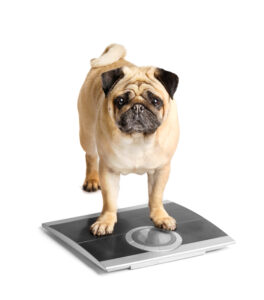When to Be Concerned About Your Dog’s Weight
 All good dog owners make their pup’s health a top priority, and maintaining a healthy weight is a critical factor in their overall health. Weighing too much or not enough can cause a wide array of other health problems, just like in humans. But it can be difficult for some people to know if their dog really is outside of a healthy weight range or if they need to be concerned, since dogs often attempt to conceal illness. Knowing the signs of weight problems in dogs can help dog owners identify any weight-related issues early and start treatment if necessary.
All good dog owners make their pup’s health a top priority, and maintaining a healthy weight is a critical factor in their overall health. Weighing too much or not enough can cause a wide array of other health problems, just like in humans. But it can be difficult for some people to know if their dog really is outside of a healthy weight range or if they need to be concerned, since dogs often attempt to conceal illness. Knowing the signs of weight problems in dogs can help dog owners identify any weight-related issues early and start treatment if necessary.
Signs Your Dog May Be Overweight
In a 2022 survey done by the Association for Pet Obesity Prevention, 56% of dogs were estimated to be overweight or obese. The numbers make it clear – something must be done to reduce weight in the majority of dogs in America. One great first step for dog owners is to be diligent about monitoring their dog’s weight and intervening efficiently with diet modifications when needed. The following signs may indicate that a dog is overweight:
- The dog is frequently tired and doesn’t want to engage in physical activities
- The dog pants excessively
- It is difficult for the dog to climb stairs and get in and out of vehicles
- The dog has a rounder face and body without definition around the ribs, spine, or waist
- The dog’s stomach seems to be sagging
Signs Your Dog May Be Underweight
We always think about being overweight when we talk about weight issues, but being underweight is just as harmful to a dog’s health. Dogs that are underweight can be more susceptible to illness and may have a harder time recovering after being sick. Be on the lookout for the following signs that a dog needs to gain a few pounds:
- The dog’s bones are visible and prominent, especially the ribs, spine, base of the tail, and hips
- The dog’s muscles seem to be getting smaller
- The dog seems to pick up all germs and is frequently sick
- The dog has an extreme swing in their eating behaviors, such as eating way too much or barely anything
- The dog seems tired and avoids physical activity
- The dog’s coat is dull, dry, or shedding excessively
Health Risks of Weight Issues in Dogs
Both obesity and being underweight can lead to serious health issues for your dog. Overweight dogs are at risk of developing diabetes, joint problems, and cardiovascular disease. On the other hand, underweight dogs often suffer from a weakened immune system, delayed development, and even organ failure.
How to Help Your Dog Achieve a Healthy Weight
Are you worried that your pooch might have a weight problem? Scheduling an appointment with a qualified vet is the first step you should take to get your dog back on track towards a healthy weight. The vet will examine your dog, ask you questions about their current dietary habits, and develop a treatment plan to help your pup gain or shed a few pounds.
Typical treatment for an overweight dog may include:
- A specialized diet
- Regular exercise
- Portion control
Typical treatment for an underweight dog may include:
- High-calorie diet
- Frequent meals
- Health screenings for other issues
Take Control of Your Dog’s Health Today
Staying at a healthy weight is important for maintaining good overall health and well-being. If you’re worried that your dog is overweight or underweight, it’s crucial that you seek care as soon as possible. Not addressing weight issues is almost sure to lead to other health problems down the road, which will in turn require more complex care to treat. If you’re in Tampa Bay and need help managing your dog’s weight, schedule an appointment with Affordable Pet Hospital today by calling 813-991-9898. We’re ready to help your furry friend live a healthy, happy, and active life.


